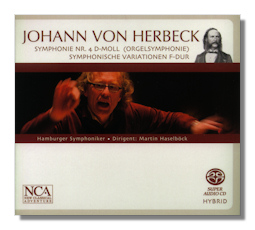
Johann Ritter von Herbeck
(1831-1877)
Symphony #4 in D minor
"Orgelsymphonie" (1877)
Symphonic Variations in F Major (1875)
Irénée Peyrot, organ
Hamburg Symphony Orchestra/Martin Haselböck
NCA 60150-215
Herbeck was an Austrian conductor and mostly self-taught composer. As a conductor in Vienna he was an influential promoter of new or little-performed works. One claim to fame is that upon being shown the manuscript of Franz Schubert's "Unfinished" Symphony he immediately realized its worth and arranged for the first performance in 1865. Herbeck admired Richard Wagner and conducted both Rienzi and Die Meistersinger. He also recognized Anton Bruckner's potential and helped him secure a position at the Vienna Conservatory.
His music is very much in the Romantic vein, reminiscent of Robert Schumann. Best known for his sacred choral works, especially "Pueri, concinite", this is the first recording of his orchestral music on CD. Both are mature works. The concise fourth symphony (25 min) is somewhat reminiscent of Camille Saint-Saëns' third symphony (written nine years later) but in a decidedly Viennese style. The organ is more prominent: for instance the fourth movement begins with a 45-second solo organ fanfare. The Symphonic Variations is a set of 12 variations on an original theme.














